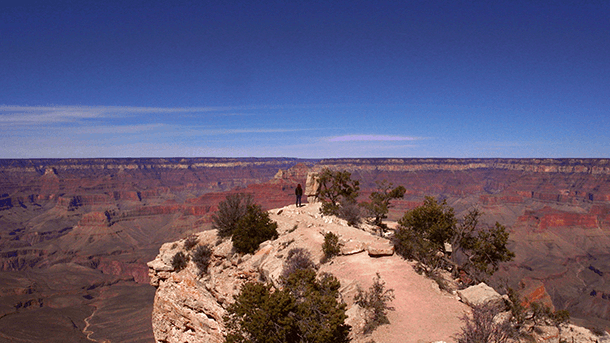Government report reveals a pattern of sexual harassment at some US national parks
A new investigation reveals a culture of sexual harassment has thrived in some divisions of the Forest Service and the Park Service for years.
For years, women in the US Forest Service and at some national parks have complained about a hostile work environment.
Now, an investigation by the Inspector General of the Department of the Interior has confirmed that at one iconic site, Grand Canyon National Park, there has been a long-term pattern of sexual harassment.
Women have been making sexual harassment claims at Grand Canyon Park since the early 2000s, says Kathryn Joyce, who recently investigated the issue for The Huffington Post’s Highline magazine. But in 2014, Joyce says, two women who had previously filed reports were fired on what many felt were trumped up allegations of misconduct.
“When that happened, 12 women and one man wrote a letter to Secretary Sally Jewell of the Department of the Interior requesting that she investigate what they cast as a culture of wild sexual harassment and retaliation against women who complained,” Joyce reports.
To their credit, the Department of the Interior moved on this pretty quickly, Joyce says. Within about a month they begin an investigation that broadened from the 13 people who originally complained to 22 other witnesses or additional victims, she says. The investigative report released in January found a widespread pattern of sexual harassment and mismanagement of complaints.
Cheyenne Szydlo, a wildlife biologist who worked in Grand Canyon National Park in 2006, was one of the women interviewed by the Department of the Interior during the investigation. She says during a canyon river trip, she was harassed by a boatman employed by the park.
Szydlo chose not to say anything about it at first. “There were no witnesses and it was just the two of us,” she says. “I was so afraid that if I filed a complaint, I would be seen as someone who was difficult to work with or didn't get along with others.”
Six months later, with the encouragement of her boyfriend, Szydlo sent an email to an HR specialist reporting the incident. She received a curt response telling her she had to have witnesses, as well as specific dates and times of the incidents.
“It was definitely written in a tone to discourage me from pursuing it — and it worked,” Szydlo says. “I dropped everything right there. I was like, they don't care, no one's going to listen and I am not willing to fight this fight.”
The investigation and the subsequent report came as a huge relief.
“I think they did a great job,” Szydlo says. “I was so surprised reading that report. It was so informative. I had no idea that this person had sexually harassed other women. I thought that I had been the only one at that time. I suspected from his behavior that it was something he had probably done before, but I had no idea how many other victims there were.”
Szydlo also had no idea that upper management at Grand Canyon had known about the complaints and had chosen not to reprimand or discipline the boatman. “As far as I know, he has not been held accountable for his actions at all. There's been no discipline whatsoever,” she says.
About a month after the report, the park service laid 18 specific steps it planned to take to address the problems.
“I think it's notable that the park service did not refute any of the allegations in the report,” Joyce says. “Instead, they talked about different personnel actions that would have to be taken, both against the remaining boatman who was still employed by the park service, as well as discipline against managers who have not handled the complaints and the reports well in the past.”
But the fight against harassment is far from over.
“In terms of the managers who seemed to have looked the other way while a lot of this was going on, to my knowledge we have not yet seen any significant action,” Joyce says. “At the Forest Service in California, it seems to be the same situation. The women there … feel that the same problems have been going on unabated for decades.”
“They have requested that the US Department of Agriculture undertake an investigation similar to what the DOI has done this past year — without success,” Joyce continues. “They have had Congressional representatives ask for it on their behalf, and to date it has not happened.”
The National Park Service Regional Director Sue Masica issued a six-page statement describing the alleged behavior as “unacceptable."
“While dismayed at the work environment described in the report, I am committed to working to change the situation and keep similar situations from happening again. The employees of Grand Canyon National Park deserve nothing less than that,” the statement said.
This article is based on an interview that aired on PRI's Living on Earth with Steve Curwood.
We want to hear your feedback so we can keep improving our website, theworld.org. Please fill out this quick survey and let us know your thoughts (your answers will be anonymous). Thanks for your time!
